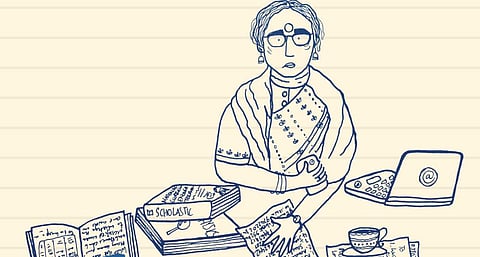

It's easy to flippantly say that students don't participate in class, but what's the bigger picture here? What if the conditions in the classroom are not conducive and don't encourage thinking or what if factors like intellectual hierarchy aren't addressed — and that's holding children back from participating? Or say, before teacher-bashing, do we consider the amount of clerical or administrative work they have? So you see, the Indian education system has many multi-layered issues which need a closer analysis. And bringing this discourse from teacher's classrooms to a more mainstream space, namely Instagram, are four passionate educationists. And their initiative is called Aaina.
"We hope to make educational conversations and academic perspectives more accessible," says Sayan Chaudhuri. This is the purpose that united friends Vrinda Bhatia, a linguistics researcher based out of Delhi and Sayan, a writing faculty at Young India Fellowship, Ashoka University to launch Aaina in February 2021. They were eventually joined by Joyeeta Dey, a sociology of education researcher currently working as a Project Associate at University of Melbourne and Teesta Nayak, an EFL teacher from Vietnam, who is their illustrator.
You've gotta see their stories come alive
Simple, conversational and story-like — that's how anyone would describe the posts of Aaina. But the thoughts and the energies that are poured into each and every post by the four are enormous. These conversations in the posts happen between teachers and students and it is through these that they are trying to represent experiences and it is while having these conversations that they hit upon valuable insights.
"There are several socially and politically conscious individuals, especially youngsters, on IG. Hence, our objective was to reach out to youngsters in a format that is appealling to them — visually. And within the visual format, there is so much scope the medium offers," explains Sayan. Now, within education, there are subdivisions, since Sayan has a PhD in pedagogy that's what he is focussed on whereas Vrinda is interested in language, policy and other such topics and Joyeeta's forte is sociology. Between them, they have a lot of ground covered as far as education is concerned.
Research that really matters
To borrow from one of their posts about class participation, the same example that we enunciated in the beginning, is addressed comic-style in which a teacher is asking a question and students, with little thought bubbles over their head, are secretly nursing a fear of getting the answer wrong or simply rueing the lack of courage when it comes to answering in the class. "We got in touch with a teacher from Delhi University to get more insight into this particular topic. Similarly, we conducted interviews with teachers who are from Tier II or Tier III cities, like University of Burdwan in Purba Bardhaman, West Bengal, to understand how tough online classes have been for them," he explains.
There is also a post on the experience of marginalised students, those experiences which otherwise we would never find out about. "Why is it that teachers are not able to understand why students are the way they are in class. We need to understand that they come from different social contexts. There are linguistic, cultural and other differences students are struggling with internally," explains Sayan.
Similarly, one of their posts is about the 'poor student'. They show three to four teachers have a discussion about one such student in the class and how they go from condescension to tagging them as irresponsible to actually struggling to understand them. There is inequality in education and there are different forms of discrimination in education. Via such nuanced portrayals of complicated issues, they hope to popularise critical pedagogical approaches in education. So rather than simply saying that the teacher is not teaching well, we should be aware of a more complex problem.
At the heart of education issues
What they want to talk about next is assessment, how it's done, and once children are graded, what happens — from social and pedagogical perspectives. Also exams — how they are designed, what goes into it and so on, which invariably leads us to the question of curriculum and the politics of it all. Also, expect posts on education funding. "What would it mean when we increase the budget of education, how does it affect everything else and so on," explains Sayan. Posting about this helps all the stakeholders of the educational system reflect on their educational experiences — to invariably gain the understanding that education is linked to society, culture and history directly.
What next? "Putting up posts are not enough and we know that. We hope to set up small discussion groups in which these topics can be discussed in much more detail and we hope to record them in the form of a podcast, document or even a simple transcript," shares Sayan. For now, they are happy that people are engaging with their content via comments and direct messages.
For more on them check out their Instagram handle @aaina_edu
